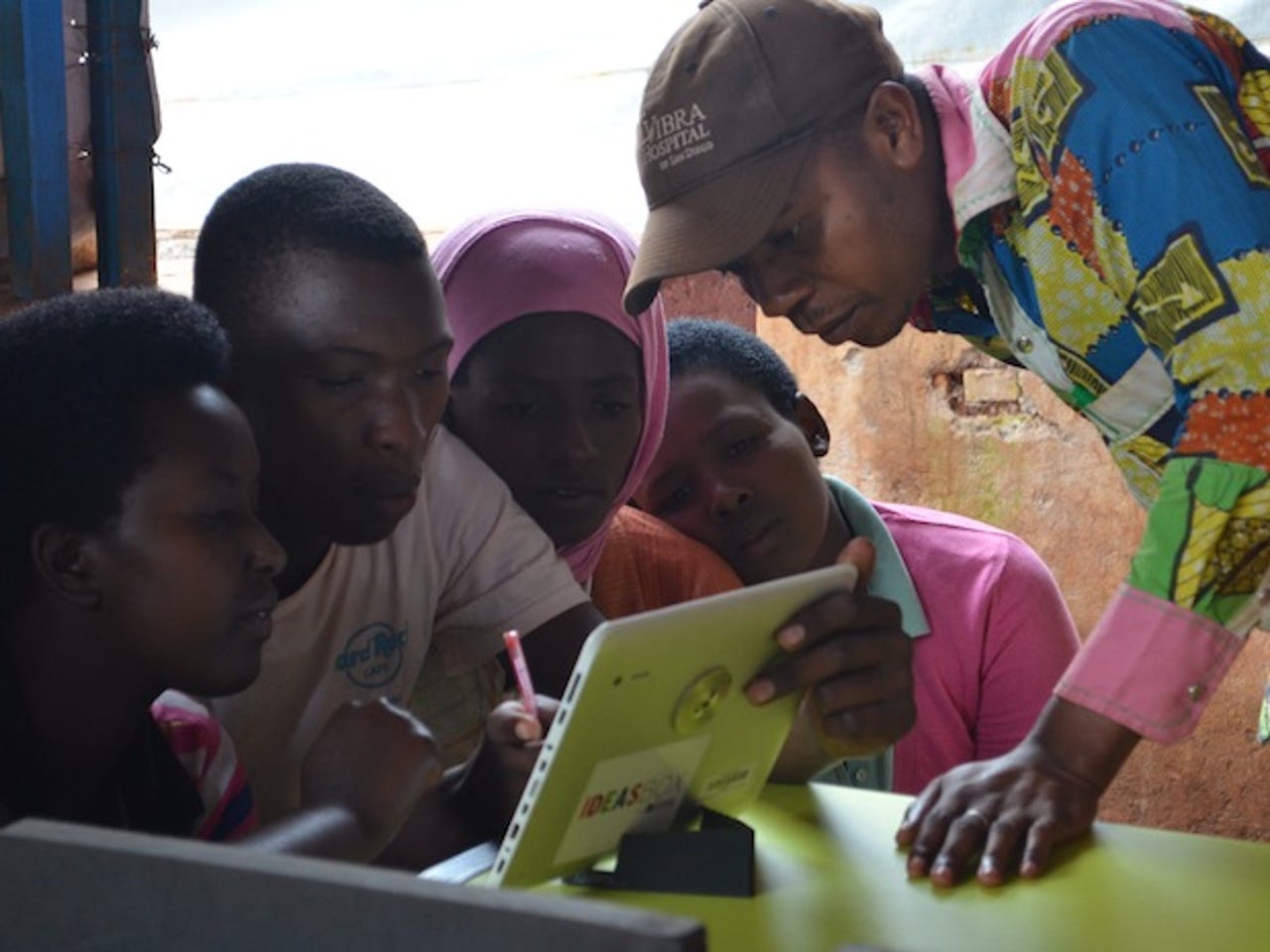Ideas Box fuses design and technology to transform refugee life


Known as the NT100, the Nominet Trust chooses projects from all over the world that use technology's transformative power to tackle social problems and drive social change. The only French project to make this year's list is called the Ideas Box, an innovative pop-up library and media centre with satellite internet, 3G coverage, and electricity that equips people living in refugee camps and post-emergency situations with education, information, and culture.
A high-tech mobile media centre
The Ideas Box is a collaboration between NGO Bibliothèques Sans Frontières (Libraries Without Borders) and the UN Refugee Agency (UNHCR), with French founding partners the Pierre Bellon Association and the Starck Network, and the US-based Alexander Soros Foundation.
The Ideas Box consists of colourful, durable crates, which create tables and chairs for 24 people and contain tools and technology that transform the unit into a high-tech mobile media centre. Contents include 15 tablets, four laptops, 50 e-readers, 5,000 e-books, 250 printed books, digital learning content from organisations such as Wikipedia and Khan Academy, a television screen, built-in projector, films, five HD cameras, a stage for theatre productions, and a GPS device.
Read this
"It was a 'reach for the stars' and we reached the stars," she says, adding that Starck worked on the project for free and that all rights for the project have been signed over - with the only condition being that it is not used in a context that is not democratic.
"He came back with a set of ideas and sketches and then his team, led by Ambroise Maggiar, turned it into a feasible 3D design that we could then give to a manufacturer. We were working on the design between July and December 2013, and then in January 2014 the first Ideas Box came out of the workshop and was sent to Burundi in February 2014," Schack explains.
The experimentation years are now in progress for the Ideas Box, which is currently available on five different sites in Burundi - four in rescue camps and one with a non-refugee population. "We're currently building the fifth Ideas Box since September 2013 and improvement feedback from the field is varied, from the number of drawers to the way the television screen folds and unfolds," says Schack.
How 'tech for good' projects made the NT100 list
For Nominet Trust, Bibliothèques Sans Frontières' dedication to understanding the impact of the Ideas Box and to sharing what is learnt in Burundi, has been a key factor behind their decision to select it for the NT100 list.
"This is a good indication that the Ideas Box has the mindset and potential to grow in a sustainable way, guided by what they are learning at each stage," says Nominet Trust CEO Annika Small. "Its focus on cultural and educational enrichment is an important recognition of the need to provide refugees not only with adequate shelter, food, and clothing, but also with opportunities for learning, entertainment, and achievement."
Following a public call for nominations back in July 2014, Nominet Trust received hundreds of submissions through the Social Tech Guide website and the Trust's research team also identified inspiring ventures for consideration. The projects are selected by a venerable panel, including Tom Hulme, general partner of Google Ventures; innovation expert Charles Leadbeater; and Lucy Bernholz, senior fellow at the Stanford University Center for Philanthropy and Civil Society.
From boxes of books to the high-tech Ideas Box
The process that Bibliothèques Sans Frontières has undergone to understand when the Ideas Box should arrive at a destination and how it can help is one that started after Haiti's catastrophic earthquake in 2010. Having been there working on general development projects, the organisation was called back to re-establish libraries and access to information in Port-au-Prince. Gradually displaced people began to feel connected again through the projects they were carrying out.
The only problem was that there was a difference between the feedback from the international community - who said the community libraries were not a priority - compared with those in the field, such as the Red Cross.
"They told us they were places of normality and hope, where people could share information and have a moment outside of the trauma," says Bibliothèques Sans Frontières' Schack. "But we were also told that the ad hoc structure we created wasn't scalable: the box of books was difficult to set up, the boxes broke, and the books couldn't be stored once they were set up in a tent."
In response, in 2012 Bibliothèques Sans Frontières set up an international cause called the Urgency of Reading, which highlighted the need for information and culture in emergency situations. But with the average stay in a refugee camp being around 17 years, once basic medical, food, accommodation, and clothing needs are met, the need to "reconstruct people despite the emergency" and equip them with access to information, education, and culture became crucial.
"And so we started to plan out what project we could propose, something doable, scalable, affordable," says Schack, adding that once they had a strong idea of what they wanted, it was then that they contacted UNHCR and the Pierre Bellon Association.
A need for global tech partners
While Bibliothèques Sans Frontières works closely with SDMO, which provides generators for the Ideas Box at "humanitarian prices", so far only a few hardware prototypes have been sent into the field and specific partnerships have not yet been created with multimedia device companies.
"This is an area where we would like to identify global partners who are interested to work with us on the items that are in the Ideas Box," says Schack. "Whether on special pricing or specific development that can match the needs of the beneficiaries."
As the Ideas Box project gains momentum, it is clear that there is scope for this extraordinary project to positively impact under-privileged and minority communities in the West as well as those in emergency situations in developing countries.
In 2015 the project will launch in Liverpool, UK, at the CILIP (Chartered Institute of Libraries and Information Professionals) Conference in July, and also in Bordeaux in February, and in Paris and Metz in April. The project organisers are working with the media centre in Calais to help serve the complexities of the migrant community in that area, and plans for the US are in the pipeline.
"This is just the beginning," says Schack. "We're also going to Australia, where the first Ideas Box will arrive in 2015 in Queensland, and, in February, the first Ideas Box should arrive in Ethiopia, in partnership with Save the Children. An Ideas Box is also going to Azraq, Jordan, specifically for the Syrian crisis, and then to Lebanon, following the results of this initial experimental project."
Read more about France
- As Google brings Loon to France, Ericsson CEO doubts balloon broadband will fly
- Tablets for all: Can a plan to jumpstart tech skills with slates for every student succeed?
- Inside the pay-by-tweet service that's poised to shake up France's payments market
- French 'right to be forgotten' decision takes link removal beyond Europe